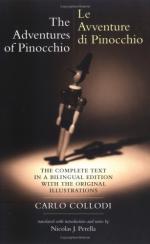“And if, instead of a thousand gold pieces, I were to find on the branches of the tree two thousand? And instead of two thousand, supposing I found five thousand? and instead of five thousand, that I found a hundred thousand? Oh! what a fine gentleman I should then become! I would have a beautiful palace, a thousand little wooden horses and a thousand stables to amuse myself with, a cellar full of currant wine and sweet syrups, and a library quite full of candies, tarts, plum-cakes, macaroons, and biscuits with cream.”
Whilst he was building these castles in the air he had arrived in the neighborhood of the field, and he stopped to look about for a tree with its branches laden with money, but he saw nothing. He advanced another hundred steps—nothing; he entered the field and went right up to the little hole where he had buried his sovereigns—and nothing. He then became very thoughtful and, forgetting the rules of society and good manners, he took his hands out of his pocket and gave his head a long scratch.
At that moment he heard an explosion of laughter close to him and, looking up, he saw a large Parrot perched on a tree, who was pruning the few feathers he had left.
“Why are you laughing?” asked Pinocchio in an angry voice.
“I am laughing because in pruning my feathers I tickled myself under my wings.”
The puppet did not answer, but went to the canal and, filling the same old shoe full of water, he proceeded to water the earth afresh that covered his gold pieces.
While he was thus occupied another laugh, still more impertinent than the first, rang out in the silence of that solitary place.
“Once for all,” shouted Pinocchio in a rage, “may I know, you ill-educated Parrot, what you are laughing at?”
“I am laughing at those simpletons who believe in all the foolish things that are told them, and who allow themselves to be entrapped by those who are more cunning than they are.”
“Are you perhaps speaking of me?”
“Yes, I am speaking of you, poor Pinocchio—of you who are simple enough to believe that money can be sown and gathered in fields in the same way as beans and gourds. I also believed it once and today I am suffering for it. Today—but it is too late—I have at last learned that to put a few pennies honestly together it is necessary to know how to earn them, either by the work of our own hands or by the cleverness of our own brains.”
“I don’t understand you,” said the puppet, who was already trembling with fear.
“Have patience! I will explain myself better,” rejoined the Parrot. “You must know, then, that while you were in the town the Fox and the Cat returned to the field; they took the buried money and then fled like the wind. And now he that catches them will be clever.”
Pinocchio remained with his mouth open and, not choosing to believe the Parrot’s words, he began with his hands and nails to dig up the earth that he had watered. And he dug, and dug, and dug, and made such a deep hole that a rick of straw might have stood upright in it, but the money was no longer there.




